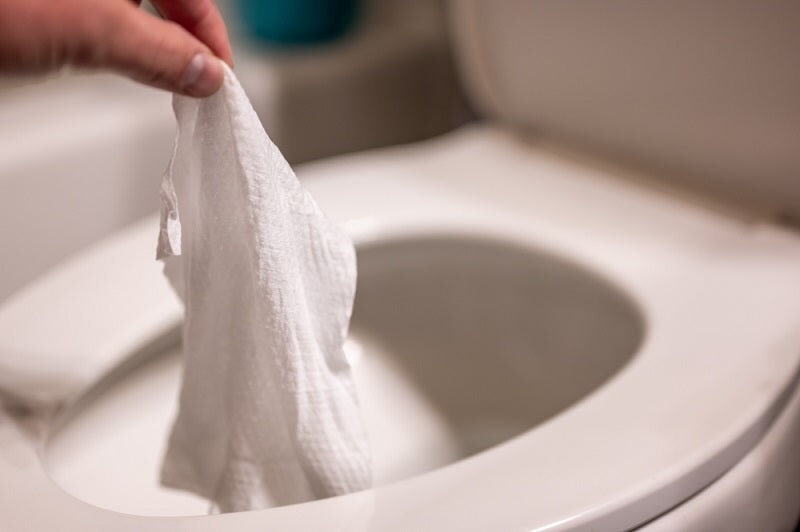
TLDR
Flushable wipes have gained popularity for their convenience, but their name is misleading. These so-called flushable products do not disintegrate like toilet paper and can cause significant damage to plumbing systems and the environment. Many consumers are unaware of the long-term consequences that come with using these seemingly harmless products.
The Flushable Wipe Deception
The Misleading Label
Despite the “flushable” label, many products do not break down effectively in water. Unlike toilet paper, which is designed to disintegrate quickly, flushable wipes remain intact, posing a significant risk to plumbing systems. These wipes are often marketed as a superior alternative to regular toilet paper, promising ease of disposal through flushing. However, their resilient composition means they often accumulate in pipes, leading to blockages and requiring professional plumbing services for removal.
Flushable wipes are composed of synthetic materials that do not decompose readily. As a result, these wipes can linger in plumbing systems for an extended period, creating blockages that can lead to costly repairs and severe plumbing issues. The misconception that these wipes are as safe to flush as toilet paper perpetuates widespread plumbing problems and environmental hazards. Additionally, the inconvenience and expense of dealing with these issues can be frustrating for homeowners and municipalities alike.
Learn more about flushable wipes vs toilet paper in our blog.
The Cost to Municipal Systems
The financial burden of flushable wipes extends beyond individual households. Municipal sewage systems are particularly vulnerable to the clogs caused by these products. City maintenance crews often encounter significant blockages, known as "fatbergs," which are massive conglomerations of wipes, fats, oils, and other debris. These blockages not only disrupt the sewage system but also require extensive labor and resources to remove, translating to increased costs for taxpayers.
The environmental impact is equally concerning. Flushable wipes contribute to water pollution, as they do not decompose and often end up in rivers and oceans. Their presence in the water supply can harm marine life and disrupt ecosystems, highlighting the need for greater awareness and responsible disposal practices. Furthermore, the time and resources spent on clearing these blockages could be better used for improving infrastructure and other essential services.
Unveiling the True Culprits Behind Plumbing Problems
What’s Lurking in Your Sewer?
The problem extends beyond flushable wipes. Many items that should never be flushed down the toilet find their way into sewer systems. Baby wipes, makeup removal pads, sanitary products, and paper towels are common culprits that exacerbate blockages. These items, like flushable wipes, do not break down and can cause significant damage to plumbing systems and the environment. Even items labeled as "disposable" can create substantial problems when flushed.
It’s important for consumers to understand that toilets are not trash cans. Anything that doesn’t decompose quickly and completely should be disposed of in the trash. Educating the public on proper disposal methods can go a long way in preventing these issues.
The “Flushable” Wipes Test Failures
Extensive research has demonstrated the inadequacy of flushable wipes. A study conducted by Toronto Metropolitan University (TMU) revealed that no flushable wipe products passed tests proving they could break down in sewer systems. The study concluded that these products are not suitable for flushing, regardless of the claims made by manufacturers. This research underscores the necessity of re-evaluating what we consider "flushable" and highlights the importance of educating consumers about the true impact of these products.
The TMU study is a crucial piece of evidence in the ongoing debate about flushable wipes. By failing to meet basic standards for disintegration, these products reveal the gap between marketing claims and reality. The study's findings call for stricter regulations and clearer labeling to protect consumers and the environment.

The Environmental and Plumbing Impact
Microplastics and Marine Life
The environmental ramifications of flushable wipes are profound. Many of these products contain microplastics, which do not decompose and pose a significant threat to marine life. When flushed, these wipes can make their way into water bodies, where they contribute to the growing problem of microplastic pollution. Marine animals often ingest these particles, leading to health issues and even death. The widespread use of flushable wipes, therefore, has a ripple effect, impacting not only plumbing systems but also the broader ecosystem.
The issue of microplastics is particularly troubling because these tiny particles are almost impossible to remove from the environment once they are released. They accumulate in the food chain, affecting not just marine life but also humans who consume seafood. The impact of these pollutants on our health and ecosystems is still being studied, but early findings suggest significant long-term risks.
Better Alternatives to Flushable Wipes
Safe and Sustainable Options
Given the substantial issues associated with flushable wipes, it's crucial to consider safer, more sustainable alternatives. Products such as toilet paper foam, reusable washcloths, and bidets offer effective cleaning without the environmental and plumbing drawbacks. These options are designed to be gentle on both the skin and the sewer system, providing a responsible way to maintain hygiene.
Reusable washcloths, for instance, can be washed and reused multiple times, reducing waste. Bidets offer a water-based cleaning method that is both thorough and eco-friendly. By exploring these alternatives, consumers can make choices that benefit both their households and the planet.
Why Toilet Paper Remains King
Traditional toilet paper remains the best option for several reasons. It disintegrates quickly in water, minimizing the risk of blockages and plumbing issues. Products like those from Reel Paper offer an environmentally friendly choice, as they are made from sustainable materials such as bamboo. Bamboo toilet paper is not only biodegradable but also non-toxic, ensuring that it breaks down efficiently without harming the environment. Choosing high-quality toilet paper supports both personal hygiene and environmental health.
Moreover, the production process for bamboo toilet paper is more sustainable than that of conventional toilet paper. Bamboo grows rapidly and requires fewer resources, making it a more eco-friendly option. By opting for bamboo toilet paper, consumers can reduce their environmental footprint without sacrificing comfort or quality. Learn more about the benefits of bamboo products in our blog.

Choose Reel Paper: The Responsible Choice
In a world where convenience often trumps sustainability, it's crucial to make informed decisions about the products we use daily. Reel Paper offers a responsible alternative to flushable wipes, providing eco-friendly toilet paper and household paper products that are both effective and gentle on the environment. By opting for Reel Paper, you are not only choosing a product that is kind to your plumbing system but also one that supports a healthier planet.
Join us in making a positive impact. Choose Reel Paper non-toxic toilet paper and be part of the solution to the growing problem of disposable wipes. Together, we can protect our plumbing systems, reduce environmental pollution, and promote sustainable living.
Sources:
- Li, Yue, Le Tao, Qiong Wang, Fengbang Wang, Gang Li, and Maoyong Song. 2023. “Potential Health Impact of Microplastics: A Review of Environmental Distribution, Human Exposure, and Toxic Effects.” Environment & Health 1 (4). https://doi.org/10.1021/envhealth.3c00052.
- Khan, Anum, Barry Orr, and Darko Joksimovic. 2019. “Defining ‘Flushability’ for Sewer Use.” Toronto Metropolitan University. https://www.torontomu.ca/content/dam/water/Research/FinalReport-FlushablesApril1.pdf.

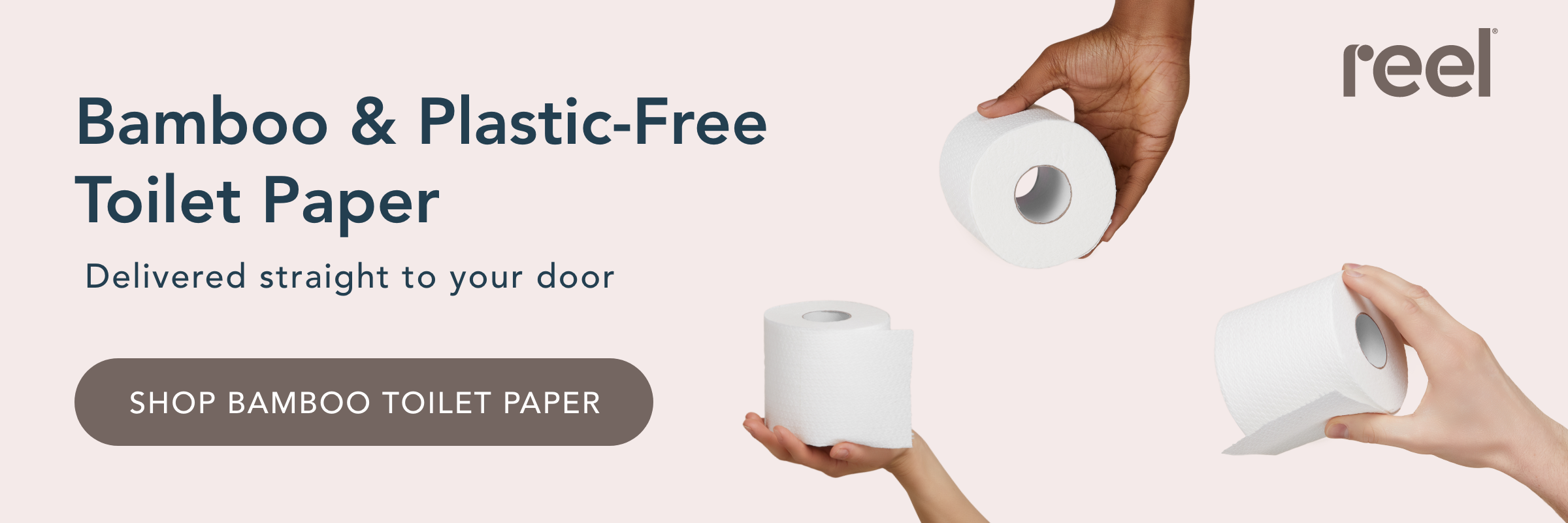
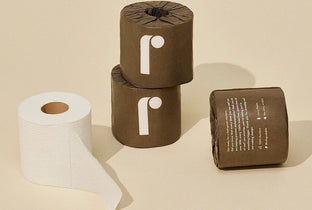
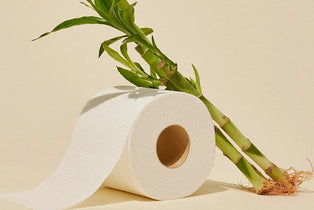
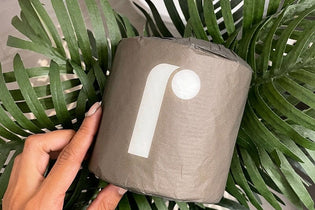
0 comments